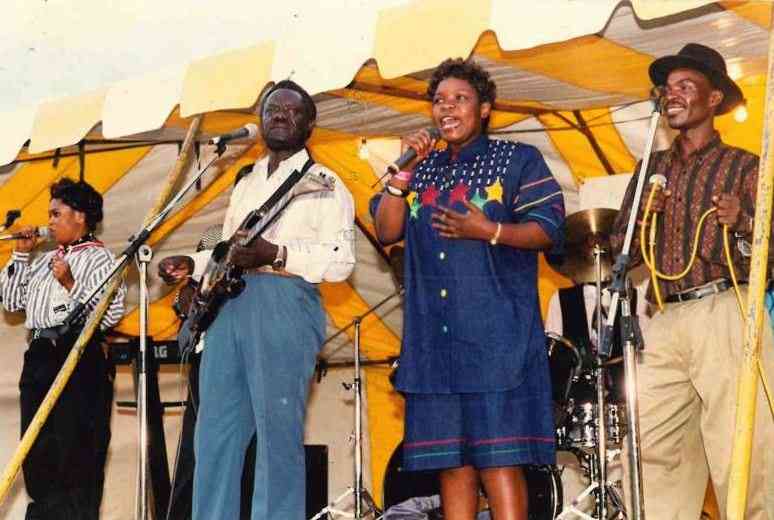
D.O. Misiani and other musicians performing in a music concert. (Courtesy)
Two popular Isabella songs composed and sang in two different African dialects by two legendary musicians born and bred in the continent have lived the test of time.
These are the work of two musical legends in Lokassa Ya Mbongo and the late Daniel Owino Misiani.
Then more recently, Kenyan boy band Sauti Sol also did their own 'Isabella', which is a love ballad that has more in common with Lokassa's hit than Misiani.
The songs by Misiani and Lokassa ya Mbongo remain classical hits. They were both titled 'Isabella' but with different inspiration, themes and meaning.
Misiani did his in the early 70s and Lokassa ya Mbongo in the mid-80s.
While Lokassa composed the Santa Isabella hit in French and Lingala, Misiani came up with Isabella Muga in Dholuo.
Santa Isabella's composition dwelt on love matters, while Misiani's was full of praise for a medicine-woman who saved his life after being bewitched in the city at a time villagers believed he was gone. The medicine woman was Isabella Muga of Kanyada in Homa Bay County.
"Isabella treated even Asians and Europeans who flocked her homestead for advise and traditional treatment. She assisted households and her work is blessed from our maker," Misiani said in the song that earned him respect in the fifties to seventies among Benga fans in the Great Lakes region.
"Hence, many villagers flocked her (Isabella Muga) homestead to seek guidance on their problems," Misiani told this writer when he performed at Lules Club in Nakuru shortly before he died.
On his part, Lokassa was attracted by a beauty in the name of Santa Isabella who lived in the city of Kinshasa.
He paired with Baked Mackerel and Dijon Potatoes to produce the hit. Misiani did his with Shirati Jazz Band.
Why did the two musicians got touched by the two Isabellas?
"This is because Isabella Muga saved Misiani's life while Lokassa could have possibly married Santa Isabella had the lady heeded his pleas. The two ladies seemed to have had a turning point on the lives of the two musicians," says Onyango Odongo, an ardent Benga fan and a supporter of the two musicians.
Elly Ogutu, an ardent fan of Lokassa Ya Mbongo, a Congolese rhythm guitarist wizard says both songs are educative to the society and they light up the need for consultations whenever faced with situations that warrants decisiveness.
Lokassa Ya Mbongo was born Lokassa Kasia Denis in Kinshasa in 1946. He traversed the globe as a performer.
He started his career in Kinshasa before shifting to Abidjan, Ivory Coast and thereafter to Paris, France.
As a rhythm guitar specialist, his services have been hired by different Congolese artistes.
He has featured with the likes of Tshale Muana, the 'Queen of Mutuashi', Tabu Rochereau of Afrisa International, Sam Mangwana's All African Stars, Nyboma Mwan Dido, Syran M'Benza, Bopol Mansiamina, Abeti, Kanda Bongo Man, Pepe Kalle, Congo-Brazzaville singer Ballou Canta, guitarist Dally Kimoko and singers Lukombo Shimita, Yondo Sister Kusala and Neil Zitany among the ace Congolese stars.
A longtime rhythm guitarist for Kanda Bongo Guy, Lokassa helped transform the Soukous, a fast-paced fusion of traditional Congolese melodies and Afro-Cuban rhythms into a global dance craze.
Some of his star hits include La Rivarite, Bonane, Issa, Lokassa's Makengo and Zamba y'Africa among the top-albums.
He moved to Paris in 1984 where he became one of the best-known Congolese rhythm guitarists, rivaled only by Bopol Mansiamina and Dechaud and made a mark as a leader and arranger, contributing heavily to the evolution and outpouring of the Congolese-Paris sound.
Misiani, on the pother hand was born in February 22, 1940 in a quiet village in Nyamagongo just north of Shirati in Mara Region, close to the eastern shore of Lake Victoria Tanzania, closer to the Kenyan border.
He moved to Kenya in the 1960s and started recording with Victoria Boys in 1965, a band that changed its name many times before it became popular and settled on Shirati Jazz Band where he sang mostly in Dholuo and Swahili languages.
He is known as a pioneer contributor to the Benga music genre where he released numerous recordings, with some international releases.
He was imprisoned on several occasions for lyrics that were perceived to be criticizing the establishment.
Misiani died on May 17, 2006 in a road traffic accident in Kisumu, on the highway to Kakamega, on a head on Collision between a minibus and a public transport van where scores were injured.
At time of his death, he was 66. He left behind two widows (Felista and Beatrice Atieno Owino) and 14 children.
Beatrice who was a long-time band member, popularly known as Queen Babito, later took over the leadership of the band.
 The Standard Group Plc is a multi-media organization with investments in media
platforms spanning newspaper print
operations, television, radio broadcasting, digital and online services. The
Standard Group is recognized as a
leading multi-media house in Kenya with a key influence in matters of national and
international interest.
The Standard Group Plc is a multi-media organization with investments in media
platforms spanning newspaper print
operations, television, radio broadcasting, digital and online services. The
Standard Group is recognized as a
leading multi-media house in Kenya with a key influence in matters of national and
international interest.
